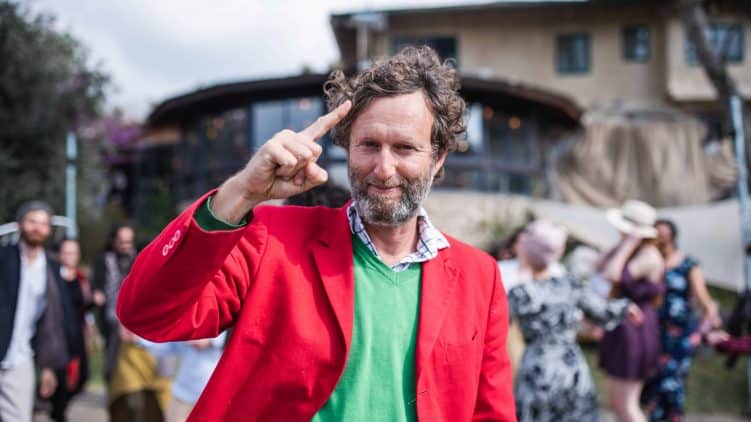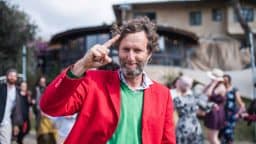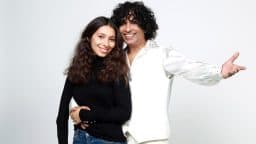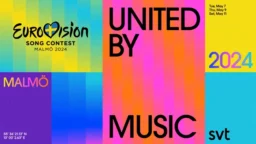He was responsible for perhaps the most talked-about Israeli Song Contest entry of all time: Sameyakh. A song with rather suggestive lyrics (‘I want to do it with him all day long’) and an act (flying the Syrian flag) that tormented many Israeli television viewers. Nineteen years later, he – Roy ‘Chicky’ Arad – is a celebrated author and successful poet. His The Israeli Dream was proclaimed one of the best Israeli books of the 21st century and recently he started making music again. How is Roy Chicky Arad doing now?
You seem to be an incredibly busy man.
I’m not busy at all. In the Middle East, it’s a joke to say you’re busy. It sounds like you’re not enjoying life enough. And I enjoy my life. Although I do a lot of things, it doesn’t feel like working. In fact, you can find me on the beach at least once a week.
Let me rephrase it. You are working as a poetsinger, script-writer, artist and political activist. Which profession do you feel most comfortable with?
I feel I’m mostly a poet. Because as a poet, I never feel locked up. I even feel like a poet when I’m dancing, making music, and so on. And yet I don’t believe there’s such a thing as poetry. Or a thing that’s called music. In my opinion, all the arts are the same. But if you look specifically at poetry, you can see that it has a number of characteristics: it is anything but efficient, not capitalistic, and certainly not liberal. One of the reasons I call myself a poet is that it’s very pathetic to say: ‘I am a poet…’ This has to do with the fact that a poet can never really be successful. A singer can be terribly successful, the same goes for a filmmaker. But even if you’re a famous poet, you’re still a failure because nobody knows you – you are a poet. It’s difficult to name a living successful poet from another country. From writing poetry, you can’t even buy a fourth-hand car. But as a singer you can be hot. You can even afford a brand-new Ferrari.
Could you define the term poetry?
Poetry is about many things. People who say poetry is about emotions have an old-fashioned view of poetry. I love the poetry that isn’t about emotions. I like poetry that deals with politics, objects, and very tangible things. Not with hackneyed terms like hate and love.
You have eight books to your name. You’ve invented a style that you call Kimo, which is defined as a Hebrew adaptation of the Japanese Haiku: it consists of three lines of ten, seven, and six syllables.
When I started writing Kimo in 2000, I wrote only poems of three lines of ten, seven and six syllables. But that’s now a thing of the past. I’m done with that kind of writing. If you do things the same way all the time, it gets boring in the long run. And that was also the case with the Kimo-style. You could compare it to PingPong: it’s something I’ve been doing for a while, for a certain period of time. If I read back those poems now, I get the feeling that it was someone else who wrote them. And because I get the feeling that someone else has written those poems, I secretly feel a little proud. It’s funny to look back on yourself that way, isn’t it?
Can you look back on Eurovision with the same distance?
Yes, for sure. When we participated in Eurovision, we were absolutely convinced that we would win. We thought we’d cry of joy, but the twelve points didn’t come up. Although no one thought we had a chance of winning, we believed we were winners. But even if we’d made it into first place, I have no idea where we would’ve ended up. Would we have travelled from country to country? Maybe then I wouldn’t have taken up poetry, maybe I would have lost myself in the pop industry. I think if you win too much in life, you’ll become a bad person. Though it can be sexy to be bad. Still, it’s nice to fail, it changes things in your life. If you become a successful popstar, people will start telling you what to do, and you become a product. That can be fun, for a while. But as a failure you will never be a product. Nobody will want to buy that product. If you fail, you’re a free man.
So there was a positive vibe around PingPong. Some members of the band even considered it a victory. Where did that feeling come from?
I think that everyone who participates in the Eurovision Song Contest expects to be successful. We loved our song Sameyakh and we were getting very good responses. We were in Sweden, where a lot of people liked us. Because we were very, very weird. It was also the first time the New Musical Express (NME) came to Eurovision: a very reputable, prominent music magazine from the United Kingdom that’s been around since 1952. They came to Eurovision for us. They sent their reporter because we were different. Because most of the Eurovision songs at the time were standard products, and we weren’t. We felt like punk.
Whose idea was PingPong anyway?
PingPong was an idea of me and my friend, Guy Assif. Actually, I already had a punk band, but we wanted something different. Something with two boys, and two girls. We had a combination like ABBA in mind. As an extension we produced a beautiful album, called Between moral and fashion, with songs like Burger ranch and I got a lover in Givati. I think we worked on that album for about four years. At the least. So, of course it is disappointing when there isn’t a single record company that shows any confidence in you. I think we were too pop-ish for the Israeli music industry. Nowadays, Israeli music is far more into pop. But in the nineties, they mainly listened to outdated rock music. And because nobody wanted us, we decided to send a song from our album to Eurovision.
The Israeli Broadcasting Authority had 84 songs to choose from that year, a voting process that took place behind closed doors. Your song, Sameyakh, came out as the winner.
And yes… we didn’t even send our best song from the album, just the one that came closest to those mandatory three minutes. We had one track that lasted exactly 2 minutes and 58 seconds: Sameyakh. Not much later we received a phone call telling us that we had won. That’s why a record company was crazy enough to offer us a contract.
The song describes an Israeli woman on a kibbutz who appears to be depressed, having a torrid affair with a man from Damascus, who is depicted in the video in a traditional headdress, or keffiyeh. It references wars and natural disasters such as floods, and when the reference to the cucumber is made, the singers sing into cucumbers…
Sameyakh is about two natural enemies who love each other. It’s about making peace with your enemy. The four of us had a strong belief in this, but the Israeli audience somehow took it very badly. We carried peace, thought we were going to win, but after Eurovision everyone was furious with us. The whole country was angry. They felt that we had hurt their pride. Also losing is not such a popular thing.
Doesn’t that have something to do with those Syrian flags? In the last seconds of your performance a Syrian flag was shown. That was quite a thing. The boss of the Israeli broadcasting network reacted furiously, didn’t he?
The real story is a bit different, to be honest. The strange thing was that the Syrian flags were already visible in our music video: the music video that we had sent to the Israeli Broadcasting Authority, which they aired in the preview, some weeks before Eurovision. The flag routine was even part of our dress rehearsal. But then suddenly, during Eurovision, it became a very big thing. I believe the Israeli Broadcasting Authority wanted it that way. Quite simply: a number of people at the broadcaster were just in great need of a scandal. It was a broadcaster with which many right wing politicians were involved. And this was their way of being able to appear on television again. So, they knew about the Syrian flags. They just wanted to generate publicity at our expense. To portray us as traitors. But it was already in the goddamn music video and in our rehearsals. Everyone knew we were going to do it. So, what was the big point? It’s all very hypocritical. Everybody in Israel was very, very happy with this year’s German candidate who waved an Israeli flag. But in our case, all hell broke loose. The Eurovision Song Contest was conceived after the Second World War, by countries such as France and Germany, that had previously been at war with one another. We only brought across the Eurovision message: stop treating each other as enemies; make peace by singing stupid songs. And then suddenly we were seen as traitors. I mean, they didn’t kill us or anything. They didn’t throw us in jail. But still, it feels very annoying to be depicted as traitors, when we only sang about peace.
Back to the song Sameyakh. You said it wasn’t the best song of your album?
There were other songs on our album that were far more interesting. For me Sameyakh is like white sugar. If you eat too much of it, it’s not very healthy. I like this kind of song, but I prefer others on the album and can still really enjoy listening to then, even after 19 years.
What place has Sameyakh taken in your life?
It has made me realize that I have a talent for failure. For example, I have written several books, but none of the books have ever been a real success. Some artists go through a bad patch after their Eurovision failure. Not me; I just carried on. I wrote poems, books. I was only 24, possibly 23, when I participated. It was only the beginning of a career. After the Eurovision Song Contest, I really took a different path. I don’t even want people to remember me as the boy from Eurovision. And this month, I released a new song.
Tell me more about your new song…
It’s about cypresses. Cypresses are part of the Israeli landscape. The Cypress Trees, a botanic hit, influenced by old Israeli tunes. I worked on it with Dvir Volk (Pingpong’s music producer) and Alma Gissis. The song is completely written in a sixties’ style; the music that was made in Israel at the time. Israeli politics have always been strongly woven into my songs and poems. In this case, the political message is wrapped up in the cypresses: trees that are often found on the military cemeteries. When you hear the song, you’ll notice the sentences are very sweet, very pastoral. At the beginning you are confronted with beautiful cypresses near a military graveyard, near a lake. But towards the end everything turns to war. This song in particular is about wars that are useless. Although I didn’t actually realise that until after I wrote it.
You have written more political songs. For example, in August 2006, you released a song against the war in Lebanon…
That song started out as a poem. It is actually a conversation between a boy from Haifa and a boy from Beirut. On 16 July 2006, eight employees of the Israel Railways were killed by direct rocket attacks on the Haifa train depot. That made a huge impression on me, also because my grandfather and grandmother lived not far from Haifa. At the same time, a lot of people died in Lebanon. And the crazy thing was, the 2006 Lebanon War was a very popular war in Israel when it started. Almost ninety percent of the people were in favour of it. It was a senseless, but popular war. I wrote some poems about the stupidity of all that violence. During the same period, I worked with Chenard Walker from France. He put music to it.
How did people in Israel react to it?
Nobody knew about those poems, and specifically that one song. In the Israeli subconsciousness Eurovision is connected to the Holocaust. Eurovision is a way to avenge and win on European soil. If you look to Israeli songs, like Hi from Ofra Haza (1983), you’ll see the reference to the Holocaust. Listen, my brothers, I’m still alive / And both my eyes still look into the light / Many are my thorns, but also my flowers / And I have countless years ahead of me. She’s singing that she is still alive. This is just one of many examples. And yes, it certainly does something to the Israelis when they get points from countries like Germany, Austria or Italy. Therefore, it was very nice that Netta’s song didn’t lean on that victimization and revenge any longer. That it had nothing to do with post-Holocaust songs. I was very happy about that.
Israel is organizing the Eurovision Song Contest this year. You live in Tel Aviv. How political is the Song Contest in Tel Aviv?
In Israel, nearly everything is about politics. And when they claim something has nothing to do with politics whatsoever, it means there are more politics to it than you could possibly imagine. But I’m not against organising Eurovision in Tel Aviv. I’m not the kind of guy who’s against joy and happiness. There are people who say that Israel should not be organising the Eurovision, because of everything that is going on with Palestine. However, that situation won’t benefit from a boycott. There isn’t a single Palestinian who would acquire rights if the Eurovision gets cancelled. I am pro-happiness.
You were one of the editors of three poetry anthologies: Aduma (‘The red’) of socialist contemporary poetry, Latzet (‘Go out’) against the 2009 war in Gaza and The Revolution Songbook following the social protest of summer 2011.
The songbook was a protest against a stupid and unnecessary war. A part of the book was published very quickly in Lebanon, in Arabic. We didn’t want to publish the book too many years after the war, but during it. There were only four days between the compilation of the book, and the final publication. Anyway, we insisted on doing it very quickly. That made it political, even a little punk. The fact that we did everything so fast, I mean. In the end, I was very proud of the result: we published a protest book during and not after the war. That was the main goal. I can’t remember exactly which poem of mine was in it. It was a compilation of many different works. Mainly by others.
You’re very socially involved. You constantly hold up a mirror to society…
Yes. But I’m not like political thinkers who are angry and pessimistic. As a human being, I am in fact waging two wars: a war against exploitation and a war against sadness. And remember: real political thinkers are far too depressed – far too serious – to be able to participate in an event like Eurovision. So, I’m anything but a standard political thinker. I’m way too optimistic. There is only one way to approach life, and that is with an optimistic eye.
In 2016, your book The Israeli Dream was chosen as one of ten best Israeli books of the 21st century. What is it about, exactly?The book consists of several short stories. The last short story from the book has been translated into English and recently published in Granta, a very famous literary magazine and publisher in the United Kingdom. It’s actually a horror story about a boy – the first person narrator – whose task is to watch over two thirteen year old twins named Coral and Tal. The most important rule is to never argue with them. His work is very monotonous; if you can even call it work. Then, one day, out of the blue, there is a call from his cousin, Alex, who is stuck in Nahariya. Alex tells him he needs a place to hide from the storm, but all the hotels are full. As the story progresses, the twins cut off cousin Alex’s limbs. There is also a short story about Be’er Sheva, the middle-class city I grew up in. It deals with the deputy mayor taking part in the elections. Everyone knows he’s going to lose the elections, and yet he still participates. And he’s corrupt. Very corrupt.
I find it painful to admit, but the first time I heard about Be’er Sheva was on the news, after the suicide bombings om commuter buses in 2004 and 2005…
By nature, I’m not a traumatized, negative-minded person. At the time it was anything but fun in Israel, but it was catastrophic in Gaza. Thinking about all that suffering, that might have hurt me the most. The constant thought of those atrocities. The fact that the war could have been avoided hurts me so incredibly. People on both sides have died for nothing. For nothing at all. So unnecessary. So unnecessary…
Will there ever be any peace between the Israeli and the Palestinians?
Of course there will be. It’s like England and Ireland, France and Germany. We’ve had many wars that are now a thing of the past, and this too shall pass. There’s an old-fashioned war going on right now. A solution won’t be easy. But it takes courage. And the right leadership. And an America that plays a pure role. Israeli and American politicians are often not very positive. Only three people are needed to solve this: the American President, the Israeli President and the Palestinian President. They all have to want to achieve this, two out of three is not enough. But yes, peace will come.
If we want to draw the attention of the Eurostory readers to one of your poems, which poem would that be?
Then I would like to draw their attention to the poem that does not exist. The poem that hasn’t been written. The poem that lies somewhere in the future. That… thát is my very best poem.






